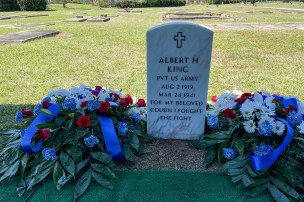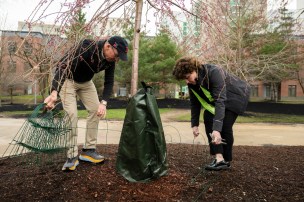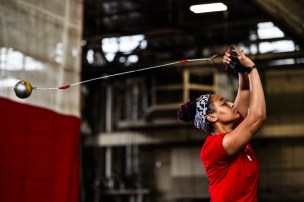Published on
For undergraduate commencement student speaker Rebecca Bamidele, politics and medicine are a potent mix
Northeastern shaped the 2024 biology and political science graduate from a shy freshman into a future doctor laser-focused on improving public health policy — with the confidence to wear bedazzled boots on a weekday.
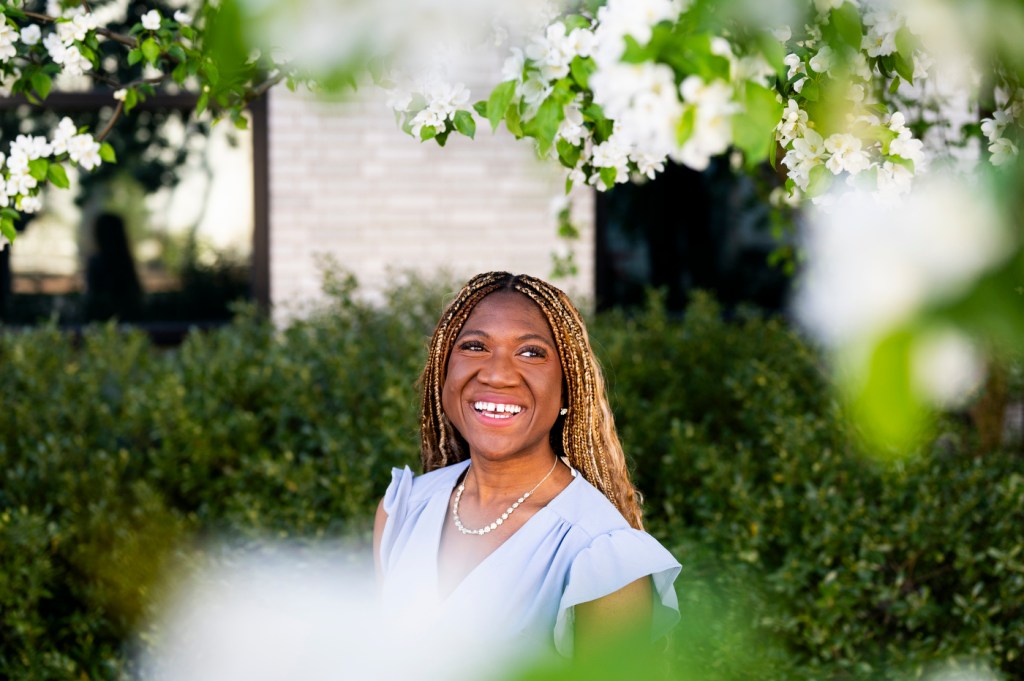
This isn’t Rebecca Bamidele’s first speech. But it’s certainly the biggest.
As senior class president, Bamidele spoke at her high school’s graduation in 2019. But the crowd on hand for Concord High School’s ceremony in New Hampshire numbered a few thousand. On Sunday, she may have an audience of more than 30,000 for Northeastern’s undergraduate commencement at Fenway Park.
Nerves would be understandable. But a week before she takes the big stage in center field, Bamidele is still riding high from getting the email — in the middle of one of her last classes, a fashion design elective — tapping her as the university’s 2024 undergraduate student speaker.
She feels more ready than anxious.
“Obviously it’s a big responsibility and a lot of pressure to speak for a whole class,” says Bamidele, a combined major in biology and political science. “But I feel so secure in my experiences, and I’m trusting that I have something valuable to say. I think that overcomes the nerves for me.”
Christine McEvoy, an adviser at Intervarsity — the campus Christian fellowship that served as Bamidele’s social and spiritual home during her undergrad years — says Bamidele should have no trouble commanding a space as big as Fenway. She expects “Reebs,” as her close friends know her, to fill the ballpark with trademark warmth and energy.
“She’s joy personified,” McEvoy says. “When Reebs gets in the room, we’re all like, ‘Oh, it’s going to be a good time now.’”
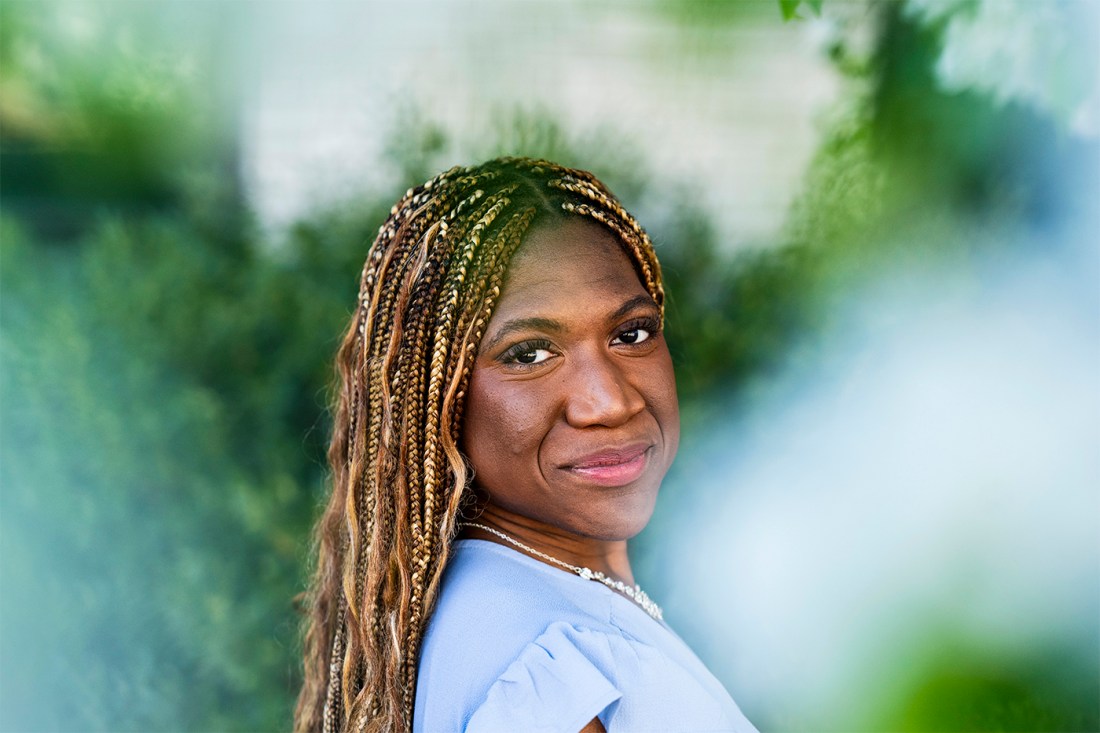
After getting a taste of it in high school, Bamidele dreamed of speaking at her college graduation — though not necessarily at Northeastern. Her older brother is a graduate of the university, and she was eager to chart a new path. “I applied all over: West Coast, the South, everywhere imaginable,” she says. “I wanted to do my own thing.”
It quickly became clear, however, that Northeastern was the best place to do just that. When she got to campus, Bamidele wasn’t totally sure how her wide-ranging intellectual interests would come together. A standout science student with plans for medical school, Bamidele also has a passion for writing, deep experience in student government and a knack for trivia. She was on her high school’s Quiz Bowl team and cites pop culture questions — not science or history — as a particular strength.
The more I learned, the more I felt compelled to do something about it.
– Rebecca Bamidele on using her Northeastern education to improve public health policy
But “Northeastern helps you figure out who you are,” she says. In her case, it’s someone with an ambition to bring training in both practical medicine and policy toward improving public health — particularly in areas with thorny systemic inequities, like maternal mortality rates in communities of color. During undergrad, she was a founding member of the Health Humanities Club, an organization dedicated to helping students think about health care through an interdisciplinary lens. At Intervarsity, she took the lead in coordinating the group’s volunteer events, like partnering with area churches on food drives.
“It really highlights that dedication that she has to serve people,” McEvoy says of Bamidele’s long-term goals. “It makes sense for the things she’s passionate about, and the way that she’s wired.”
That multifaceted trajectory only became clear to Bamidele through the combination of coursework, co-ops and community engagement that is a hallmark of a Northeastern education.
“There are a lot of doctors who don’t necessarily have political knowledge, but also a lot of political people who don’t understand health care,” she says. “I think having more people who can understand the needs between those two spaces will help make a better system overall.”
In a sense, that intersection of interests is in Bamidele’s blood. Her mother is a pharmacist; her father is an attorney who works with advocacy groups including the Refugee Human Rights Center. Her parents emigrated from Nigeria and settled in Concord a few years before her eldest brother was born. Bamidele says that straddling of two cultures helped shape an open mindset, in terms of both backgrounds and intellectual modes of looking at problems.
“Understanding how two very different things fit together has always interested me,” she says. “I never felt the need to confine myself to being just one thing.”
As a kid, she certainly didn’t. A musical theater lover, she sang and acted in school productions; her favorite role was Nala in “The Lion King.” She played saxophone in the high school band and was active in student government, all while winning academic honors for outstanding work in her chemistry and Latin classes. Coming from a relatively small city in New Hampshire, she was drawn to the urban bustle of Northeastern’s Boston campus.
“Northeastern is not just in Boston, It’s really in Boston, if that makes sense,” she says. “You’re out in the world, not confined to your college campus. I could see myself growing into the person I always hoped college would make me into.”
She was interested in medicine but initially unsure she wanted to be a health care worker. “My first year, I was in more bioengineering courses,” she says. But the broader possibilities of the medical field came into focus when she took a seminar in U.S. health and welfare policy; the issues the class addressed “sparked her soul.”
“The more I learned, the more I felt compelled to do something about it,” she says. “That’s what got me leaning toward political science.”
She dove into more classes at the intersection of health and policy, including Social Problems in Health Care. The class was “sitting with some of those really hard topics, like doctor-assisted suicide, and how we allocate organs or vaccines,” she says. “This was also during COVID-19. So there were a lot of new moral and social problems. It was interesting, as a 19-year-old college student trying to work out the answers to questions that even people in power didn’t necessarily know.”
On co-op, it became clear that she could tackle those broad, systemic issues while helping patients on an individual level. Her first position was at Voyager Therapeutics, a biotech company developing gene therapies for neurological diseases. Her second, as a clinical assistant at the Massachusetts Eye and Ear hospital, had her interacting with patients and doctors every day.
“It solidified that I was interested in that,” Bamidele says. “I definitely had hard days, and it could be a lot. But those moments of sitting with people who were overwhelmed or answering their questions helped me see that this was something I liked, and that I had a gift for.”
Ruth Stuart, a close friend and 2024 graduate in criminal justice, says she and Bamidele bonded, in part, over their ambitions to ignite sweeping changes from the ground in their chosen fields.
“What drew me to criminal justice is the inequities within the system, so my desire is to go directly into law enforcement to try to make a difference,” Stuart says. “Similarly to Rebecca in the medical field.”
On Sunday, Bamidele will call on her fellow graduates to reflect on the ways Northeastern helped shape them — in a personal sense as well as an academic and career-oriented one. For her, that meant blossoming from an 18-year-old who had trouble making friends to a 23-year-old who wants to talk to everyone and has formed lifelong bonds; from a wallflower trying desperately to escape notice to the first one on the dance floor, and “someone who walks around Boston in bedazzled knee-high boots on a Tuesday just for the sake of turning heads,” per her speech.
And she’ll shout out the things she and the rest of the class of 2024 will miss about the Boston campus: bacon-egg-and-cheese sandwiches from Wollaston’s; cozying up for study sessions at Snell; catching the Green Line to the Beanpot after class.
“I’ll miss the familiarity, and those moments of running into my people and feeling known,” she says. “Even on a campus this big, it makes it feel a little smaller.”
Schuyler Velasco is a Northeastern Global News Magazine senior writer. Email her at [email protected]. Follow her on X/Twitter @Schuyler_V.




